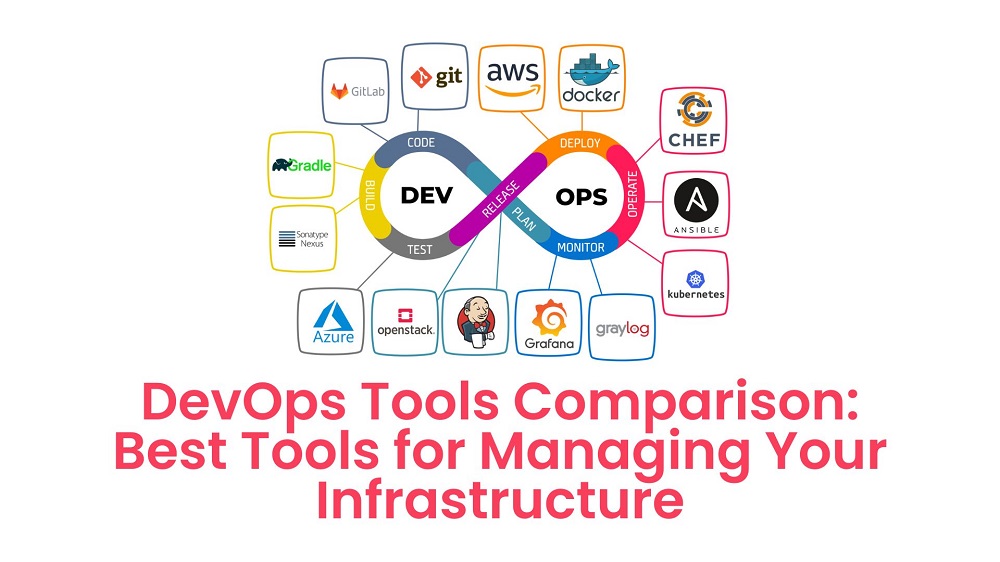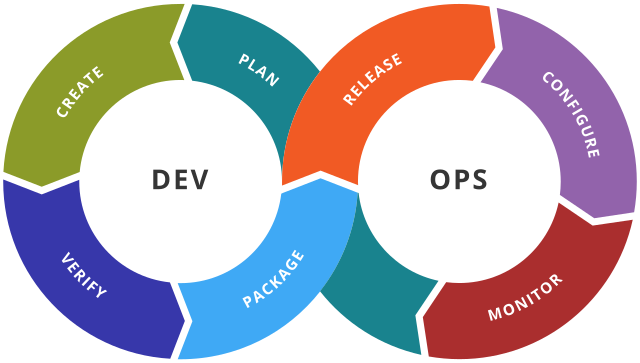
We have seen a lot of questions about DevOps and “DevOps Tools Comparison” and its related queries — so today we decided to cover the top queries we’ve received. It is suitable for anyone seeking direct answers on topic related to DevOps.
Use the Link below to find the section that matters to you, the most:
- Containerized app
- DevOps Chef vs Ansible
- DevOps tools comparison
- GCP Deployment Manager vs Terraform
- GCP Terraform documentation
- HashiCorp Terraform Enterprise
- Infrastructure as code Terraform
- Install Kernelcare
- Is Terraform a configuration management tool?
- DevOps tool?
- Is Terraform agentless?
- Is Terraform an automation tool?
- Is Terraform an orchestration tool?
- Kernelcare
- Kernel live patching
And if you want to learn about just DevOps alone — use the 6 links below for that:
- DevOps
- DevOps tools comparison
- DevOps best practices
- DevOps case studies
- DevOps trends
- DevOps for specific industries (e.g., DevOps for finance, DevOps for healthcare, etc.)
Containerized app (DevOps Tools Comparison)
A containerized app is an application that runs in a container, which is a standardized unit of software that packages up code and all its dependencies so the app can run quickly and reliably from one computing environment to another.
DevOps Chef vs Ansible
Chef and Ansible are both popular DevOps tools, but they have different strengths and weaknesses.
Chef is a good choice for managing complex infrastructure environments, while Ansible is a good choice for managing infrastructure in a simpler and more ad-hoc way.
DevOps tools comparison
There are a number of different DevOps tools available, each with its own strengths and weaknesses. Some popular DevOps tools include:
- Chef
- Ansible
- Puppet
- Terraform
- Jenkins
- Git
- Docker
- Kubernetes
GCP Deployment Manager vs Terraform
GCP Deployment Manager and Terraform are both infrastructure as code (IaC) tools that can be used to provision and manage infrastructure on Google Cloud Platform (GCP).
However, they have different strengths and weaknesses.
GCP Deployment Manager is a good choice for managing simple infrastructure environments, while Terraform is a good choice for managing complex infrastructure environments.
GCP Terraform documentation
The GCP Terraform documentation provides comprehensive information on how to use Terraform to provision and manage infrastructure on GCP.
HashiCorp Terraform Enterprise
The HashiCorp Terraform Enterprise is a commercial version of Terraform that provides additional features, such as collaboration and sharing, version control, and security and compliance.
Infrastructure as code Terraform
Terraform is an infrastructure as code (IaC) tool that can be used to provision and manage infrastructure on a variety of platforms, including AWS, Azure, and GCP.
Terraform uses a declarative language to define the desired state of infrastructure, and then leaves it to the tool to figure out how to achieve that state.
Install Kernelcare
To install Kernelcare, you can follow these steps:
- Download the Kernelcare installer from the Kernelcare website.
- Run the installer and follow the instructions.
Is Terraform a configuration management tool?
Yes, Terraform can be used as a configuration management tool. Terraform can be used to define and manage the configuration of infrastructure resources, such as servers, networks, and storage.
Is Terraform a DevOps tool?
Yes, Terraform can be used as a DevOps tool. Terraform can be used to automate the provisioning and configuration of infrastructure, which is an important part of the DevOps process.
Is Terraform agentless?
Yes, Terraform is an agentless tool. This means that Terraform does not require an agent to be installed on the managed nodes.
Is Terraform an automation tool?
Yes, Terraform can be used as an automation tool. Terraform can be used to automate the provisioning and configuration of infrastructure, which can save time and improve efficiency.
Is Terraform an orchestration tool?
Terraform is not primarily an orchestration tool. However, Terraform can be used to orchestrate the deployment and configuration of infrastructure across multiple servers.
Kernelcare
Kernelcare is a live patching solution that can be used to patch the Linux kernel without rebooting the system. This can help to improve the security and stability of Linux systems.
Kernel live patching
Kernel live patching is the ability to patch the Linux kernel without rebooting the system. This can be useful for patching security vulnerabilities and for fixing bugs.

DevOps
- DevOps is a set of practices that combines software development (Dev) and IT operations (Ops)
- To shorten the systems development life cycle
- And provide continuous delivery
- With high software quality.
- And provide continuous delivery
- To shorten the systems development life cycle
DevOps is complementary with Agile software development; several DevOps aspects came from Agile methodology.
DevOps tools comparison
There are a number of different DevOps tools available, each with its own strengths and weaknesses. Some popular DevOps tools include:
- Chef
- Ansible
- Puppet
- Terraform
- Jenkins
- Git
- Docker
- Kubernetes
DevOps best practices
There are a number of DevOps best practices that can help organizations to improve their software development and delivery process.
Some common DevOps best practices include:
- Continuous integration (CI): CI is the practice of automating the building, testing, and integration of code changes.
- Continuous delivery (CD): CD is the practice of automating the deployment of code changes to production.
- Infrastructure as code (IaC): IaC is the practice of managing infrastructure using code.
- Containerization: Containerization is the practice of packaging software into containers, which are standardized units of software that can run on any platform.
- Microservices: Microservices is an architectural style that breaks down applications into small, independent services that can be developed, deployed, and scaled independently.
DevOps case studies
There are a number of successful DevOps case studies that can provide valuable insights for organizations that are looking to implement DevOps.
Some notable DevOps case studies include:
- Netflix: Netflix uses DevOps to deploy new code to production multiple times per day.
- Amazon: Amazon uses DevOps to power its e-commerce platform, which handles millions of transactions per day.
- Google: Google uses DevOps to develop and deploy its wide range of web services.
DevOps trends
The field of DevOps is constantly evolving, and there are a number of trends that are shaping the future of DevOps.
Some of the most important DevOps trends include:
- The rise of cloud computing: Cloud computing is making it easier for organizations to adopt DevOps practices.
- The increasing popularity of containers: Containers are making it easier to develop, deploy, and scale applications.
- The shift to microservices: Microservices is becoming an increasingly popular architectural style for DevOps applications.
- The rise of AI and machine learning: AI and machine learning are being used to automate many aspects of the DevOps process.
DevOps for specific industries
DevOps can be applied to a wide range of industries, including finance, healthcare, and manufacturing.
Here are some examples of DevOps for specific industries:
- DevOps for finance: DevOps is being used by financial institutions to improve their software development and delivery process.
- For example, banks are using DevOps to deploy new software to production more quickly and to improve their security posture.
- DevOps for healthcare: DevOps is being used by healthcare organizations to improve their software development and delivery process.
- For example, hospitals are using DevOps to deploy new software to production more quickly and to improve their patient care.
- DevOps for manufacturing: DevOps is being used by manufacturing organizations to improve their software development and delivery process.
- For example, manufacturers are using DevOps to deploy new software to production more quickly and to improve their product quality.
POSTED IN: Cloud Computing